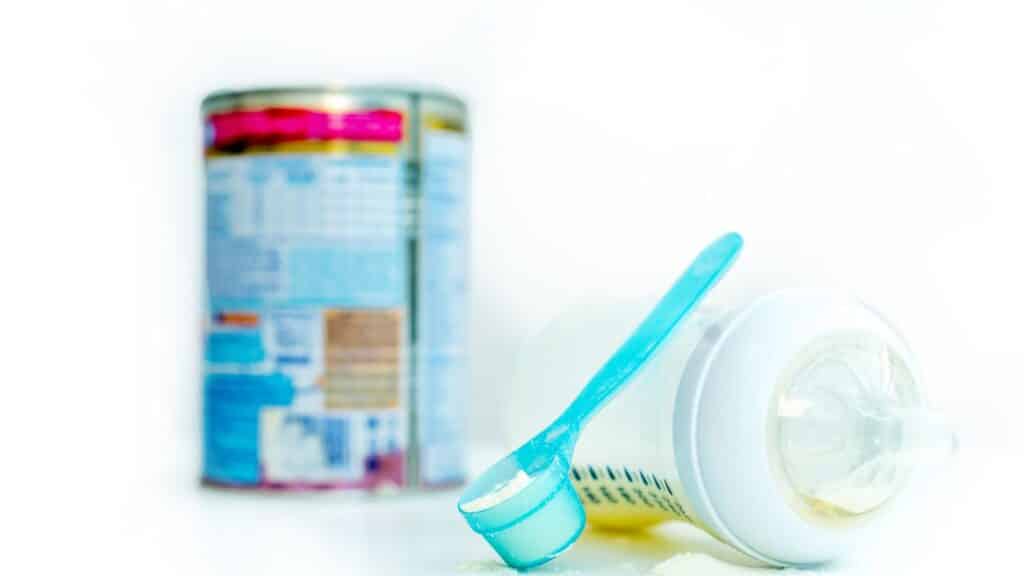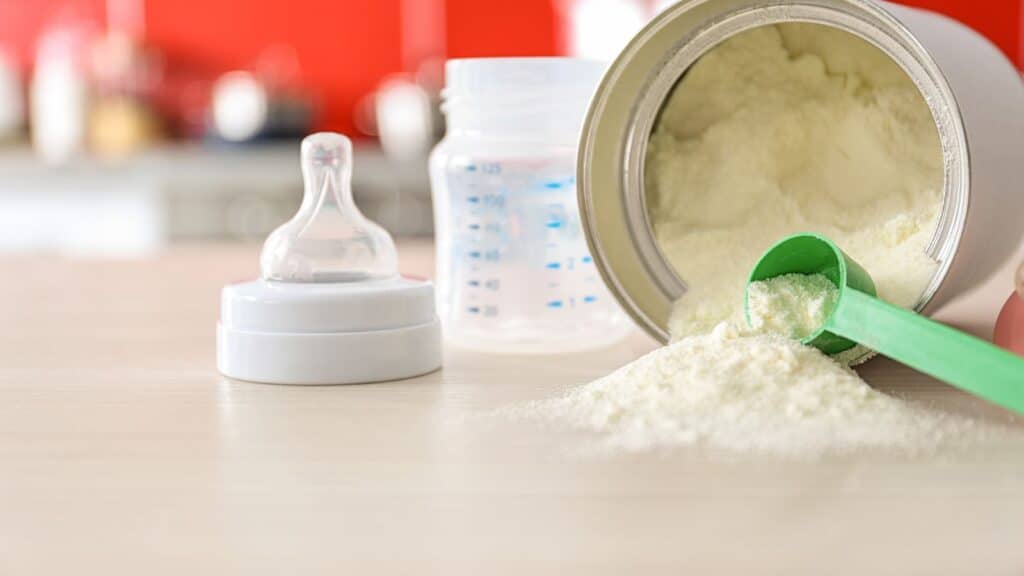Choosing the right water for baby formula is crucial, and so is the debate between organic and non-organic baby formulas. Parents often wonder whether it’s beneficial to switch to organic, considering the ingredients and overall health implications.
This guide will highlight how water quality impacts baby formula and whether going organic makes a significant difference. We’ll explore the key differences and facts, aiding in making an informed decision for your baby’s nourishment.
What Defines Organic Baby Formula?
Organic baby formula is not just a trend; it’s regulated by strict standards like the USDA Organic certification in the United States. This seal means the formula meets the guidelines, including organic ingredients, environmentally friendly practices, and no synthetic pesticides or fertilizers. It assures parents that what they’re mixing with water for baby formula is natural and pure.
In the European Union, the standards are similarly stringent. The EU organic logo on your baby’s formula indicates compliance with EU regulations, covering everything from ingredients sourcing to animal welfare and even the processing methods used. It’s a rigorous process to ensure your little one’s formula is safe and wholesome.
When scanning the labels of organic baby formula, you’ll often find these non-organic substances are notably absent:
- Pesticides: Conventional formulas may contain traces of pesticides used in crop production, which organic versions avoid to limit exposure to these chemicals.
- Growth Hormones: Organic formulas are free from synthetic growth hormones, like rBST, often given to dairy cows but excluded to prevent potential health risks.
- GMOs (Genetically Modified Organisms): By selecting an organic product, you’re also saying no to genetic engineering, ensuring your baby’s formula is as natural as possible.
- Antibiotics: Organic formulas do not contain antibiotics that are commonly used in conventional agricultural practices, helping to reduce the risk of antibiotic resistance.
- Artificial Colors and Flavors: Organic baby formulas are free from artificial colors and flavors, emphasizing the use of natural ingredients for your baby’s health.
- Heavy Metals: Organic standards also help prevent the inclusion of harmful heavy metals, often found in contaminated soils used in conventional agriculture.

What About Non-Organic and Non-GMO Formulas?
Parents examining baby formula options often explore alternatives to organic choices. To better understand their standards and characteristics, here’s what you need to know about non-organic and non-GMO formulas.
What About Non-Organic Formulas?
Non-organic formulas do not adhere to organic certification standards. While they might still offer complete nutrition, they can include ingredients from conventional farming practices, which may use synthetic pesticides or fertilizers. The regulations for non-organic formulas are less strict regarding the source of ingredients, though safety standards for the final product remain high.
And Non-GMO Formulas?
While not organic, non-GMO formulas guarantee that none of their ingredients have been genetically modified. This offers peace of mind for parents looking to avoid GMOs but who might not be ready to commit to organic products. They adhere to different standards, like the Non-GMO Project Verified seal, which provides an additional layer of quality assurance when you mix them with water for baby formula.
European Standards vs FDA: Stringency in Organic Formulas
European standards and FDA regulations don’t always see eye to eye on organic baby formulas. Let’s discuss the specifics of each to understand the contrast.
European Standards:
- The EU’s organic certification requires that a significant percentage of the ingredients be sourced from organic farms, with a clear focus on sustainability and animal welfare.
- Carbohydrate sources in EU organic formulas are often strictly controlled, ensuring they’re derived from lactose naturally found in milk, unlike some non-EU products that may use sugar or corn syrup.
- Reputed brands like HiPP, Holle, and Lebenswert are known for meeting these strict EU standards, which often exceed the expectations of their counterparts in the U.S.
FDA Regulations:
- While still robust, the FDA’s organic certification allows for a broader interpretation of what constitutes an organic formula, including a wider range of allowed carbohydrate sources.
- Certain synthetic ingredients prohibited by the EU may be permitted under FDA regulations, although the aim to minimize artificial substances is a common goal.
- American parents seeking formulas that meet both FDA standards and are closer to EU stringency might opt for brands that comply with both, ensuring the water for baby formula is mixed with the highest quality product.
Considering the Quality and Type of Water for Formula Preparation
A research study underlines that the quality of water for baby formula is as crucial as the formula itself because contaminants can impact a baby’s health. The right water ensures that your baby gets the nutrition they need without any harmful extras.
1. Distilled Water
Opting for distilled water is a safe bet, as it’s free of impurities and minerals that could affect a baby’s developing system. It’s especially recommended for mixing with formula to avoid exposing babies to unnecessary chemicals or minerals.
2. Nursery Water
Nursery water is sterilized and often contains added fluoride, which can be suitable for babies over six months. However, it’s best to consult a pediatrician about fluoride needs before choosing this option for preparing baby formula.
3. Tap Water with a Filter
If you prefer using tap water, consider equipping your home with a high-quality water filter. A filter can remove potential contaminants while keeping beneficial minerals, making it a cost-effective and environmentally friendly choice for mixing with baby formula.

Conclusion
We’ve explored various aspects of baby formulas, from organic to non-GMO and non-organic options, and the distinct standards set by the European Union and the FDA. Understanding these differences helps in choosing the most suitable formula. Moreover, the importance of selecting the right type of water for baby formula cannot be overstressed, as it plays a critical role in your baby’s health and development.
Each family’s situation is unique, and while one type of formula might be perfect for one baby, another might respond differently. Parents should consider their specific needs and preferences, always keeping their baby’s health as the top priority. Opting for high-quality ingredients and safe water sources will ensure that your baby gets the best start in life.



